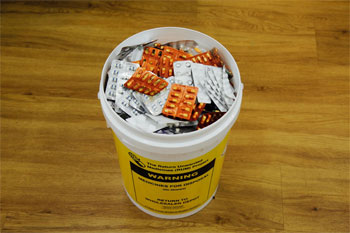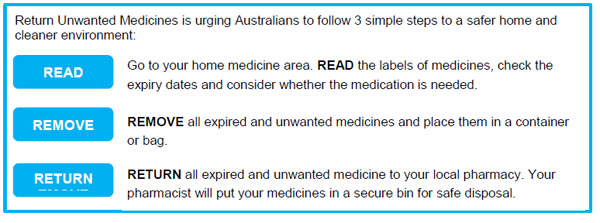Natalie Barr Old Medicine Pose Health Hazards Interview

Natalie Barr Old Medicine Pose Health Hazards Interview
With more than 5,000 children ending up in hospital due to medicine poisonings each year, Return Unwanted Medicines has launched a new awareness campaign that explains the dangers of keeping expired and unwanted medicine in the home and explains how people should to dispose of medicines responsibly.
It is estimated that there are millions of medicines sitting in Australian homes – either out-of-date or no longer needed. These quantities of medicines pose a huge danger of accidental poisonings and medication mismanagement.
According to the Australian Poisons Information Centres, 5,580 children required hospitalisation due to medicine poisonings across Australia in 2015. In the same year, the Centres also received more than 32,000 calls relating to children being unintentionally exposed to medicines. Most accidental poisonings occur in children younger than five years old, with children aged one to three years being at the greatest risk.
Return Unwanted Medicines - or the RUM Project - is a Federal Government-funded initiative that provides all Australians with a free and convenient way to dispose of expired and unwanted household medicines. Anyone can return their medicines to any community pharmacy at any time, for safe collection and disposal.
A recent Griffith University study of over 4,300 Australians* found more than 80% of people are completely unware of the RUM Project and do not know how to dispose of unwanted medicines safely and appropriately.
'Last year alone, over 700 tonnes of medicines were collected and safely disposed of by the RUM Project, preventing it from ending up in waterways or landfill. If that's only medicines collected from around 20% of the population, imagine how many more are hiding in bathroom cabinets and kitchen drawers across the country," said Toni Riley, Project Manager, RUM, and community pharmacist.
The Griffith University study also revealed that most respondents (67%) said they disposed of unwanted medicines with the usual household garbage; followed by being poured down the drain or to
ilet (23.3%) and less than a quarter (23%) actually disposed of their medication by returning it to a pharmacy.
'By following three simple steps of READ, REMOVE & RETURN, Australians can minimise the risk of unintended poisonings and medication mix-ups, and do their bit to protect the environment," continued Ms Riley.
For more information on Return Unwanted Medicines, visit returnmed.com.au or talk to your local pharmacist.
Interview with Natalie Barr, Sunrise 7 News Presenter and RUM Spokesperson
Question: What is RUM?
Natalie Barr: RUM, short for Return Unwanted Medicines, is a government-funded initiative and the main goal is to raise awareness about the dangers of keeping out-of-date or unnecessary medication in our home medicine cabinets. RUM also aims to educate Australians about how to dispose of our medications properly. The main problem is... a lot of us are throwing our old medications in the bin, or pouring them down the sink. The big problem with this is, it's really damaging to the environment.
 Question: Why have you decided to become a RUM Spokesperson?
Question: Why have you decided to become a RUM Spokesperson? Natalie Barr: I was really surprised when I discovered the number of medicine poisonings in children (over 5,000) each year and it's even more frustrating when you realise some of these cases could have been easily prevented.
The government reckons there are millions of old medicines sitting in our cabinets and drawers at home – medicines that are either out-of-date or no longer needed. They're all posing a possible risk to Australian families. Like a lot of people, I actually didn't realise that the best way to get rid of your old medication is to put it all in a bag and take it to your local pharmacy. They have big collection bins where you can dump it all.. and then everything is disposed of in an environmentally friendly way.
Question: How do you avoid medication confusion or mismanagement?
Natalie Barr: Through consistently checking the use-by dates on general medications and disposing of prescriptions once they're no longer needed, clutter in the cabinet is minimised, giving Australians less of a chance to self-prescribe medication or to be confused over which medicines are in and out of date.
Question: Have you had a safety issue with previously unwanted medicines?
Natalie Barr: I've had friends who have. It's just so easy to have a toddler start munching on a packet of tablets that's left around in an old sports bag or handbag or somewhere else that's accessible to kids when you're not watching them for a few minutes. Although the biggest risk of poisoning is to children between the ages of one and three, medical mismanagement is an issue that we all must address because it can really happen at any age. A lot of us have taken a wild guess about what that old packet was prescribed for!
After hearing about the initiative and the high rate of child poisoning across the country, it really made me stop and think about the importance of keeping a clean cabinet and regularly checking the use-by dates on old medications. To be honest, I was pretty slack like a lot of people.
 Question: How should we be disposing of medication correctly?
Question: How should we be disposing of medication correctly? Natalie Barr: A central feature of the RUM initiative is to stress the point of returning old or unwanted medication to your local pharmacy. Your pharmacist will then be able to dispose of the medication in a safe and environmentally friendly manner.
Last year over 700 tonnes of medication was safely collected and disposed of by RUM, preventing it from ending up in waterways or landfill.
Question: What message would you like to send as a RUM Spokesperson?
Natalie Barr: My goal as a RUM spokesperson is to raise awareness in Australian homes about the importance of checking your medicine cabinet and explaining how simple it is to dispose of your medicines in a safe and eco-friendly manner.
With more than 5,000 children ending up hospitalized due to medicine poisonings every year in Australia, there's never been a more important time to educate Australians about this initiative.
Interview by Brooke Hunter
MORE




